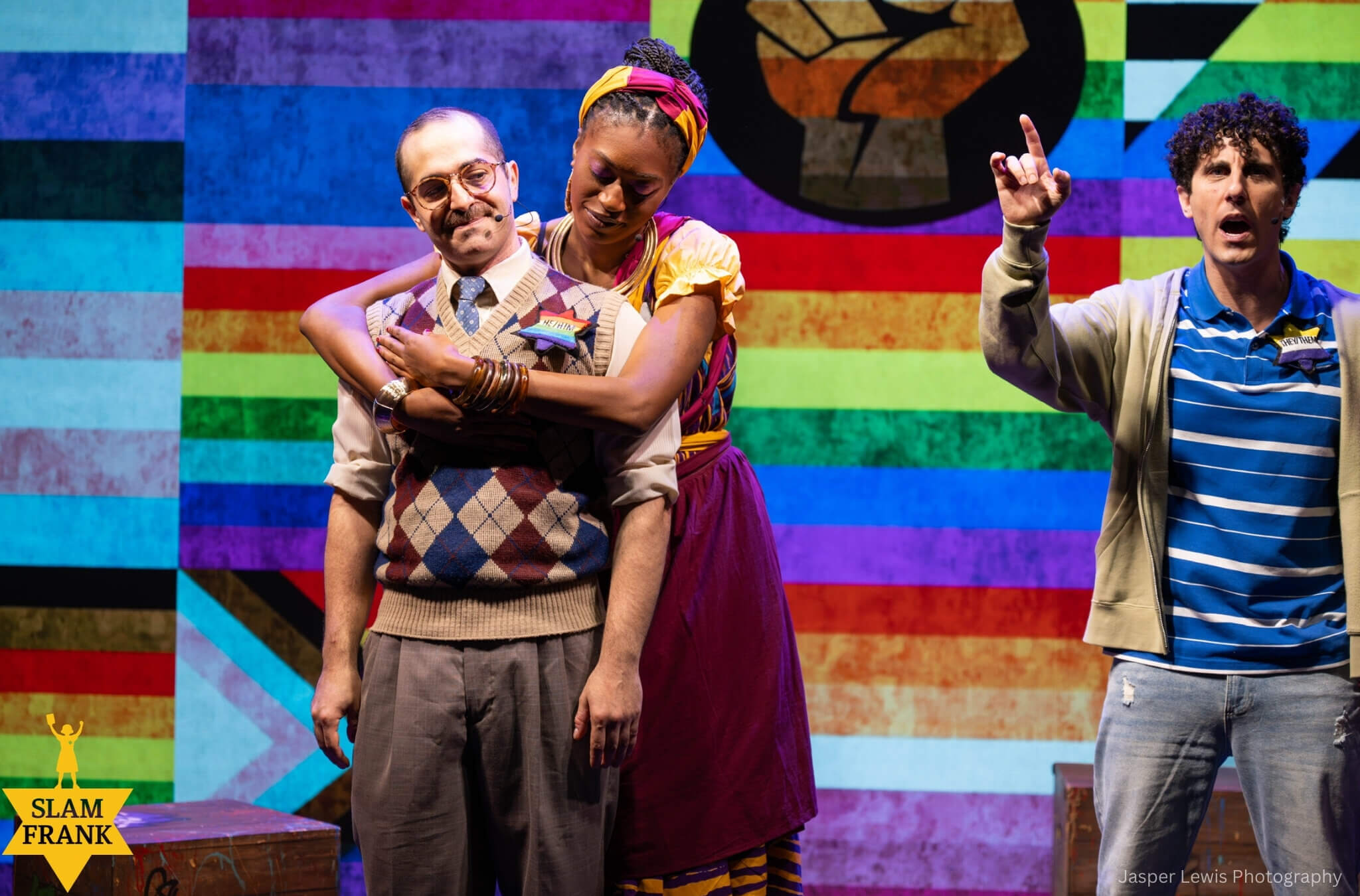The new Anne Frank musical wants you to laugh at ‘woke culture’ — but is it funny?
In ‘Slam Frank,’ it’s hard to tell who’s in on the joke and who is just…in it.

In ‘Slam Frank,’ Edith and Otto Frank are an interracial couple who proudly wear pronoun pins in place of yellow stars. Photo by Jasper Lewis Photography
Editor’s Note: This story has been updated from an earlier version.
Reactions to Slam Frank, Andrew Fox’s musical satire in which Anne Frank is rewritten as a Latinx pansexual girl named “Anita,” have been mixed. Some have called it a timely, comedic takedown of cultural hypersensitivity while others see it as a shonda to the memories of Holocaust victims. In interviews, Fox has refused to break the character of a playwright obsessed with woke culture, so there is no insight from him to understand the musical. Somehow, the show resists fitting neatly into any understanding of humor, making it hard to know exactly who — or what — you’re supposed to be laughing at.
In his 1655 book The Element of Law Natural and Politic, Thomas Hobbes explains humor through what he calls “superiority theory,” which argues that “laughter is nothing but sudden glory arising from some sudden conception of eminency in ourselves, by comparison with the infirmity of others.”
There’s also self-deprecating ethnic humor, where one makes jokes about their own ethno-racial group, often highlighting historically demeaning stereotypes or characteristics. In his book Ethnic Humor in Multiethnic America, scholar David Gillota describes it as a “psychological defense mechanism” that takes the power of aggression away from the dominant group since jokes about a minority community are being made by its own members.
Then there’s “culturally intimate humor” which SUNY Farmingdale professor Evan S. Cooper defined in his dissertation “I don’t get It?: Culturally Intimate Humor and Its Audiences,” as a familiar use of culturally specific stereotypes in a positive manner. Contemporary scholars have argued that some ethno-racial humor is a way for minorities to create group solidarity and make fun of the dominant culture, a tactic which Cooper calls “protest humor.”
Because Slam Frank pokes fun at so many identities using a diverse cast and crew, it is impossible to put it neatly into any one category of humor.

At points, the show seems to mock Zionism, anti-Zionism, and Judaism simultaneously. But is this an example of protest humor against the demonization of Jews? Is it a Jewish writer engaging in self-deprecating humor? Or is it superiority humor that looks down at religious Jews? Paradoxically, it could be all three at the same time, but it is impossible to say.
If you understand the jokes about neurodiversity and pronouns as a form of protest humor against “woke culture,” does that mean the playwright sees political correctness as the dominant narrative in our society right now? In an age where diversity, equity, and inclusion initiatives are being targeted by the federal government and political lobbyists have suggested trans people should be considered a terrorist group, the idea that fighting inclusive culture is punching up feels ignorant. But at the same time, even among the left and among those whose identities are under attack — people who make up the cast and crew of Slam Frank — there seems to be an exhaustion with identity politics’ overpolicing of who can say what.
The jokes take on a whole new life in some of the merchandise. Among the items available for purchase in the lobby are t-shirts featuring a photoshopped image of Anne Frank as a nightclub DJ, trucker hats that say “Problem Attic,” and kippot with the Slam Frank logo — a yellow Star of David where the top point has been replaced with a silhouette of Frank, a la Hamilton’s iconic symbol. Unless you confront a wearer on the street, it will be hard to know why the person feels the need to advertise the show. Did they love the musical so much because of its mockery of antisemitism? Or were they enthralled by the takedown of Zionism? Or are they just celebrating a show that made them laugh?
When it comes to Slam Frank, it seems that the only true conclusion is that there is no certain message, which is frustrating for audiences who want to understand what they’re watching. It is particularly hard when we’re living in a time where society seems to constantly demand we proclaim a socio-political opinion on everything.
As a musical, Slam Frank actually holds its own, with pretty catchy — if not politically correct — songs and good performances. But every time I was compelled to laugh with the audience, my amusement was mixed with apprehension and guilt. I knew why I thought the overdone Black American Accent and caricatured Jewish stereotypes were funny; but it’s hard to relax when you don’t know if the rest of the audience is laughing with you or at you.
















